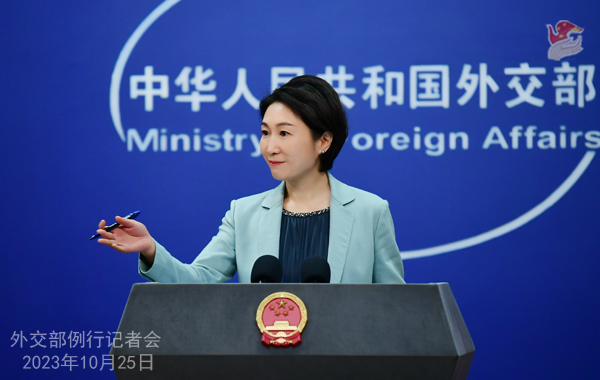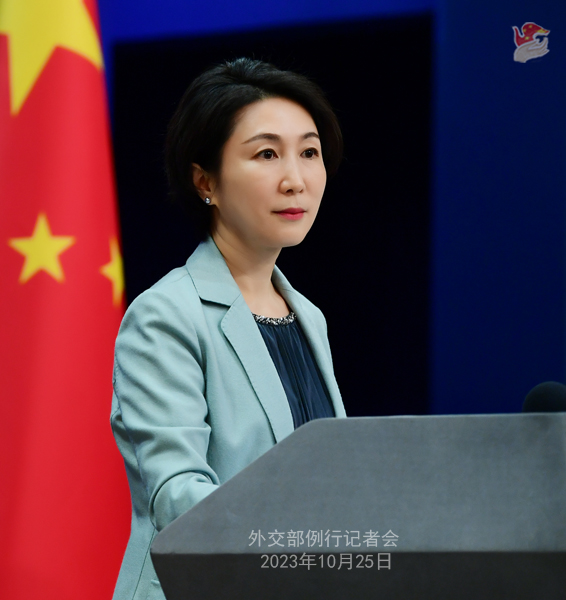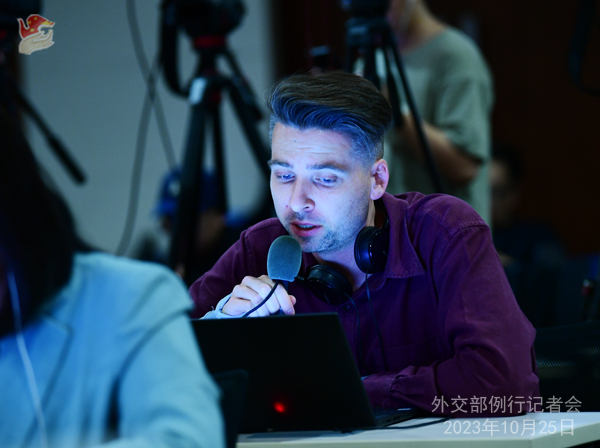| Foreign Ministry Spokesperson Mao Ning’s Regular Press Conference on October 25, 2023 |
| 2023-10-25 18:37 |
|
CCTV: The International Symposium to Commemorate the 10th Anniversary of China’s Principle of Amity, Sincerity, Mutual Benefit and Inclusiveness in Neighborhood Diplomacy was successfully held yesterday. Could you share more details? Mao Ning: This is indeed a very important symposium. Over 200 participants attended the symposium both online and offline, including political figures from neighboring countries, heads of international and regional organizations, diplomatic envoys of neighboring countries to China and renowned experts and scholars from both home and abroad. They had extensive and in-depth exchange of views on the theme “Amity, Sincerity, Mutual Benefit and Inclusiveness: New Dimensions, New Development and New Vision”. President Xi Jinping delivered a written message, in which he took stock of the fruitful outcomes of China’s practices in following the principle of amity, sincerity, mutual benefit and inclusiveness, explained the new dimensions and new development of the concept and blueprinted the new vision of China and its neighbors pursuing common development in the future. Member of the Political Bureau of the CPC Central Committee and Director of the Office of the Central Commission for Foreign Affairs Wang Yi delivered a speech. On the principle of amity, sincerity, mutual benefit and inclusiveness and jointly building an Asian home, Director Wang proposed that China should work with regional countries to make Asia an exemplar for Belt and Road cooperation, a pacesetter for implementing the Global Development Initiative, a pioneer for implementing the Global Security Initiative and a front runner for implementing the Global Civilization Initiative. Before the Symposium, Director Wang had a group meeting with foreign guests attending the event. Vice Minister of Foreign Affairs Sun Weidong attended the closing ceremony and delivered a speech. Experts and scholars from various countries had extensive, in-depth and warm discussions on good neighborliness, sincerity, mutual benefit, openness and inclusiveness, and put forward constructive advice and suggestions at the four sub-fora. On the day of the Symposium, we also issued a document entitled “Outlook on China’s Foreign Policy on Its Neighborhood in the New Era”. Helsingin Sanomat: According to the statement of the central police investigating force in Finland, the damage to a Baltic Sea gas pipeline was caused by a ship dragging a large anchor along the sea bed. The anchor has been found in the sea bed next to the pipeline. According to the police, Chinese ship NewNew Polar Bear is the main suspect. It was at the spot exactly at the time of the incident, and it has been later seen sailing apparently without one of its anchors. The ship did not respond when Finnish authorities tried to contact it at the Finnish economic waters. I have three questions. Number one, how do you comment the current results of the investigation? Number two, have Chinese officials been able to talk to the captain and other people on the board? What do they say about the incident? And number three, has the state of China any connection to the ship or the incident of broken gas pipeline? Mao Ning: Let me take these three questions altogether. China always holds that the international community needs to strengthen cooperation to jointly safeguard the safety and security of transboundary infrastructure. This is very important. China maintains unimpeded communication with parties including Finland over this incident you mentioned. The incident is still under investigation. We hope relevant parties will follow the principles of being objective, fair, just and professional and find out what happened soon. China stands ready to provide necessary assistance in accordance with international law.
China Review News: It’s reported that Australia returned precious cultural relics to China on October 25. The handover ceremony was held in the Chinese Embassy to Australia. Can you give us more details? Mao Ning: China and Australia signed the MOU on cultural relics protection in 2009. Since then, Australia returned one piece to China in 2015 and this time another four lost cultural relics as well as one ancient fossil. We appreciate Australia’s effort. This marks another successful practice in cultural heritage protection and recovery and return of lost cultural relics cooperation between our two countries, and sets a fine example of China-Australia people-to-people exchanges. China Daily: At its sixth Meeting, the Standing Committee of the 14th National People’s Congress recently voted to ratify the Protocol against the Illicit Manufacturing of and Trafficking in Firearms, Their Parts and Components and Ammunition (Firearms Protocol). Could you share with us the significance of the ratification and China’s future plan? Mao Ning: Gun proliferation seriously undermines people’s lives and social stability of all countries and disrupts world peace and sustainable development, drawing widespread international attention. The Firearms Protocol, as the important consensus of the international community on jointly strengthening firearms control and regulation, is the only legally binding instrument to counter crimes such as illicit manufacturing of and trafficking in firearms at the global level. As a major step to actively implement the Global Security Initiative and uphold international and regional peace and stability, China initiated the domestic legal procedure of approval of the Firearms Protocol last September. The decision of the Standing Committee of the National People’s Congress implicates that relevant legal procedures are almost concluded. China will deposit the ratification document to the UN Secretary General at an early date. China has been universally recognized as one the safest countries with the lowest crime rate and the fewest gun and bomb attacks. China has stipulated strict laws and regulations to prevent, combat and eradicate the illicit manufacturing of and trafficking in firearms, their parts and components and ammunition, which firmly defends national security, social stability and a tranquil life for the people. As a permanent member of the UN Security Council and a responsible member of the international community, China stands ready to take the ratification of the Firearms Protocol as an opportunity to strengthen exchanges and cooperation with all parties to make greater contribution to building a peace and safe world free from gun-violence.
CCTV: President Xi Jinping’s keynote speech at the opening ceremony of the third Belt and Road Forum for International Cooperation has attracted great attention. I noted that President Xi Jinping pointed out, let us “build an open, inclusive and interconnected world for common development, and jointly build a community with a shared future for mankind.” How do you assess the role of the Belt and Road Initiative (BRI) in building a community with a shared future for mankind? Mao Ning: President Xi Jinping pointed out in his keynote speech at the Forum that “humankind is a community with a shared future; and win-win cooperation is the sure way to success in launching major initiatives that benefit all.” Guided by the vision of a community with a shared future for mankind, the Belt and Road Initiative (BRI) has become a long-term, transnational and systematic global project. At the same time, the successful BRI cooperation has constantly enriched the connotation of the vision of a community with a shared future for mankind. Belt and Road cooperation reflects the values of a community with a shared future for mankind. The BRI embodies the common values of mankind, is committed to the principles of extensive consultation, joint contribution and shared benefits, and the concepts of open, green and clean cooperation, and aims at high standards, sustainability, and better lives. Geopolitical games are not a choice for us. We stand against unilateral sanctions and economic coercion, leading in the right direction of global governance. Belt and Road cooperation is an important platform for building a community with a shared future for mankind. Over the past decade, China has signed Belt and Road cooperation documents with more than 150 countries and over 30 international organizations, launched 20-plus multilateral cooperation platforms in professional domains. The expansion and advancement of Belt and Road cooperation will make the platform of the community with a shared future for mankind more diverse. Belt and Road cooperation will bring new opportunities for building a community with a shared future for mankind. The Belt and Road is an initiative that charts a new course for common progress of the humanity and will surely provide stronger boost and greater space for global modernization. As the BRI enters a new stage of higher-quality and higher-level development, we believe it will definitely open up a new and more splendid chapter for building a community with a shared future for mankind. Global Times: During the General Debate of the United Nations General Assembly this year, leaders of many African countries condemned Western countries for abusing sanctions and interfering in internal affairs of African countries. Today, October 25, is the Anti-Sanctions Day declared by the Southern African Development Community (SADC). African countries have called on the West to lift illegal sanctions on Zimbabwe as soon as possible. What’s China’s comment? Mao Ning: The 39th SADC Summit held in 2019 named October 25 as the Anti-Sanctions Day and called on the US and some other Western countries and organizations to remove sanctions on Zimbabwe. Today, on the occasion of the fifth Anti-Sanctions Day, we noted that multiple African countries have once again strongly called for lifting the sanctions. China supports that. The unlawful sanctions of the US and some Western countries on Zimbabwe, which have lasted for over two decades, have seriously violated the country’s sovereignty, infringed upon the development right of the Zimbabwean people, and disrupted the international political and economic order and the global governance system. China, as always, firmly supports Zimbabwe in opposing external interference and keeping to its own development path. We once again urge the few countries and organizations to listen to the international call for justice, lift the unlawful sanctions on Zimbabwe as soon as possible, take responsible and concrete steps to help the country develop its economy and improve people’s wellbeing, and play a constructive role in promoting world peace and development. AFP: According to reports, Ikram Nurmehmet, a Uyghur film-maker, will appear on trial in Xinjiang today, and he is being held on unknown charges. Could the foreign ministry provide more details on his trial? Mao Ning: I’m not aware of what you mentioned.
|
 | ||||||||||||
 | ||||||||||||
|



